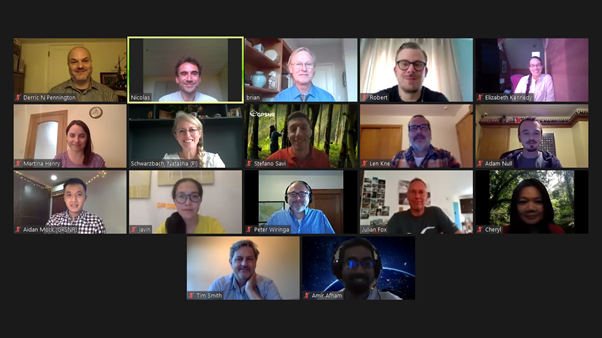7th October 2020

The ISEAL Innovations Fund, which is supported by the Swiss State Secretariat for Economic Affairs SECO, recently awarded a new multi stakeholder initiative. Outcome based standards – a landscape approach will provide a scalable, science and participatory-based approach for assessing and improving the landscape outcomes of voluntary sustainability standards (VSS) across sectors. The key outcomes of the project are to:
- Measure the impacts of VSS on multiple commodities
- Develop an innovative method to inform VSS stakeholders of risks in supply chains
- Identify how and where VSS can adapt to maximise benefits
- Identify policies that will increase uptake of VSS
- Identify the economic benefits of VSS adoption
- Align VSS and users impact reporting with SDGs
The project is being co-led by Bonsucro and the University of Minnesota, three corporate partners: Diageo, PepsiCo and Tetra Pak and two additional sustainability standards: the Roundtable on Sustainable Palm Oil (RSPO) and the Global Platform for Sustainable Natural Rubber (GPSNR).
Scope of the project
Voluntary sustainability standards (VSS) are developed to galvanise social and environmental improvements in agriculture and create transparency in supply chains. Commodity buyers and those involved in VSS want science-based principles and methodologies to help future standard setting. In addition, VSS and their users want to provide credible impact assessments and scenarios in real time to help evaluation. Furthermore, consultation will help to decide where to target standard adoption to maximise environmental performance.
‘Outcome based standards – a landscape approach’ will gather and analyse data to measure the impact of VSS across sugarcane, palm oil and rubber, qualify risks in supply chains, demonstrate where standards can adapt to increase impact and identify policies to increase uptake. A geospatial tool will be developed to allow stakeholders to explore the impact of different VSS scenarios in “real-time” and inform decision-making. In addition, the economic benefits and costs of VSS adoption will be identified. Standards will be linked to the United Nation’s Sustainable Development Goals and other popular commitments such as the science-based targets.
The research is led by the University of Minnesota with The Natural Capital Project. The Initiative will assess each of the three VSS involved to fully understand regional “hotspots” in terms of environmental and economic opportunities and challenges. It will also summarise results at the regional and country-level and evaluate VSS performance against the national-level SDGs for South Africa, Mexico, Brazil, China, Malaysia, Indonesia, and India and identify opportunities and challenges given local context. This country-level analysis will pilot the development of country-level VSS criteria and indicators to explore the interplay and degree of reliance between standards in terms of its regional net-environmental-impacts.
The researchers will develop and apply a new spatially-explicit approach for commodity risk and mitigation assessments. Empirical predictive models will quantify and map risk then assess sustainable pathways for mitigation. The approach will consider yield, water use, nutrient loading, greenhouse gas emissions from cultivation and land conversion, land use change, habitat loss, and economic costs. The models can then be used to evaluate the potential impact of different mitigation policy instruments such as certification standards, deforestation-free commitments, and impact financing.
This data and information will allow decision makers to evaluate different policy scenarios and prioritise future activities to minimise risk while maximising outcomes in a cost-effective way. This is the first time that sustainability standards will work together to try such a forward-looking and innovative approach.
The project will also provide recommendations to ISEAL to inform future standard setting. Guidance will also be available for commodity buyers to help influence sustainable sourcing decisions.
Robert Lefebure, Senior Manager, Innovations, at ISEAL said, “This research can redefine how standards demonstrate and communicate their value to key stakeholders, by providing clear insights into the potential environmental benefits of standards adoption.”
Project kick off
The project started in mid-August with three days of online workshops influenced by design thinking principles. The workshops helped to launch the collaborative aspects of the project and develop base information about:
- Theories of change for voluntary sustainability standards
- Pathways of impact for voluntary sustainability standards
- Metrics and indicators for voluntary sustainability standards
- Relationship of voluntary sustainability standards with sustainable development goals
- Enhancing a decision support tool for voluntary sustainability standards.
The workshop successfully facilitated an open dialogue for setting bodies and their buyers to cultivate a deeper understanding on how VSS are viewed and used by their respective institutions. Each shared their theories of change, pathways to impacts and metrics with respect to VSS.
Over the next couple of months, the team at the University of Minnesota will map and evaluate the similarities and differences between VSS standard setting bodies and VSS buyers’ theories of change, pathways of impact and metrics. In the next six months, the team will provide an opportunity for VSS stakeholders to experience and evaluate a beta visualisation tool for forecasting the environmental impacts of adopting Bonsucro’s environmental criteria in the sugarcane industry, globally.
The initiative is made possible thanks to a grant from the ISEAL Innovations Fund, which is supported by the Swiss State Secretariat for Economic Affairs SECO.






